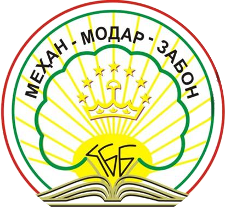Address by the President of the Republic of Tajikistan to the Parliament of the Republic of Tajikistan
Distinguished Members of Senate and Lower Chamber of the Parliament!
Esteemed Compatriots!
This year is recorded as another successful year with the achievements and progress made by our people in the history of independent Tajikistan.
Implementation of activities mentioned in the “National Development Strategy of Tajikistan to 2030” and “Mid-term Development Program of Tajikistan for 2016-2020” facilitated making firm steps in achieving our supreme objective, i.e. improving the living standards of the noble people on Tajikistan.
In 2019, the real growth of GDP made 7.5% and this indicator was achieved through increased production of industrial products by 13.4%, agricultural products by 7.1%, trade by 8% and fee-based services by 1.6%.
During the last seven years, the average annual growth of the country’s economy constituted 7% and the GDP increased from 45.6 billion TJS in 2013 to 78 billion TJS in 2019.
In this period, the public budget increased by almost two times and reached 23 billion TJS in 2019 against 12 billion TJS in 2013. During these years, the population income increased by more than two times and the average salary of every employee did so by 2.4 times. The outstanding savings in the banking system in 2019 accounted to more than 9.5 billion TJS and it has increased by 45% during the last seven years.
The poverty rate declined to 27.5% and the average longevity went up to 75 years. Concurrently, based on analysis the mortality indicator decreased by almost two times, including the mortality among the children under the age of five by 3.2 times during the independence period. While the private sector’s share in GDP was 54% in 2013, it reached 70% in 2019. Overall, the targets for seven years envisaged in 2013 in the Presidential election campaign were reached.
The Government is mandated to pay a priority attention to the quality of the national economy’s development, human capacity building, expansion of the final products production with the use of latest technologies and through introduction of innovations, fostering population’s economic activity, enhancement of the system for support of entrepreneurship and investment, as well as expansion of digital economy.
Increasingly tense trade competitions between countries urges us to undertake necessary actions in estimating risks and minimizing their impact on our national economy as well as improvement of the competitiveness of domestic production. In this regard, the Government is mandated to undertake necessary measures to increase our GDP to 87.4 billion TJS, and ensure its annual growth at the rate of 7.8% and ensure 26 billion TJS of the public budget revenue in 2020. It is also important for the Government to ensure the real growth of GDP at the rate of 7-8% annually, its volume by more than 1.8 times and the GDP per capita by 1.7 times, and increase the share of middle class to 45% of the total population and reduce the poverty rate to 18% during the next seven years.
Now we are about to complete the first phase and to start the second phase of Tajikistan’s National Development Strategy to 2030. In this regard, the Government is requested to develop and adopt mid-term development program for 2021-2025 by the end of 2020.
With a view to introducing digital technologies in socio-economic sectors at the earliest possible, about which I emphasized in my Address of the last year, the Government also needs to develop and implement the Concept of Digital Economy and based on that the mid-term program for digital economy development.
In the context of market economy and digitalization of administration and production, the public authorities need to adjust the unified economic policy focusing on the use of market-based mechanisms and methods only.
At the meeting I had with representatives from financial, tax, customs, investment and banking system institutions, I made a special request to draft revised tax code. The officials in charge need to focus on encouragement of local producers and ensuring further simplification and clear system of tax administration and improvement of investment climate while drafting this document.
We need to pay a serious attention to private sector’s development and ensure a unified legal framework for operation of all economic actors disregard of their ownership form.
In order to protect and support entrepreneurship and encourage investments, the Government introduced more than 30 additional incentives and benefits in the areas of light industry, agriculture, pharmacy, poultry, animal husbandry, tourism and other priority sectors during the last three years.
Between 2016 and 2018 alone, the incentives we introduced amounted to more than 15 billion TJS as the financial contribution of the State to development of socio-economic sectors. Furthermore, during the last three years the number of business inspections decreased by six times thanks to the reforms implemented by the Government. While in 2016 almost 300 000 inspections of businesses were carried out, this year 48 000 inspections took place only.
Our objective from improvement of the legislation which is aimed at supporting and developing the private sector, particularly production of final products, is to introduce a clear system of taxation, simplify procedures for permits and licensing and decrease their number, align the procedures for delivery of public services with the latest requirements and introduce incentive measures.
The Government and the Parliament need to pay a primary attention to these issues while discussing and improving the legislation, particularly the revised tax code.
The Government, having paid a special attention to investment of economy’s sectors as a core tool for expedited industrialization, has been undertaking specific measures to improve investment climate and encourage more foreign direct investments.
Different sectors of economy received 57.3 billion TJS of foreign investment, including almost 30 billion TJS of direct investments during 2013-2019.
It is expected that the documents we have adopted will make it possible to encourage greater amount of foreign direct investment and its share would reach 10% of the GDP in 2020.
We implemented more than 80 public investment projects and channeled 13.2 billion TJS of public investment to the country’s economy between 2013 and 2019 for implementation of priorities mentioned in programs. Currently the portfolio of ongoing public investment projects includes 66 initiatives with the total amount of 32.4 billion TJS. There are plans to implement additionally 23 new public investment projects with the total amount of 3.8 billion TJS in 2020.
The State Committee for Investment and State Property Management, ministries and agencies and governors of province, district and town need to radically change their activities to improve the investment and business environment and use of different incentive tools by mobilizing all available resources and windows of the country’s economy.
It is also important to strengthen cooperation with domestic and foreign companies to encourage foreign direct investment with a view to creating small and medium manufacturing enterprises, particularly in the sectors of light and food industries.
The Government is mandated to establish a bank to fulfill the tasks of the Business Support Fund with a view to supporting the small and medium enterprises, particularly production enterprises, and local exporters. At the same time, it is important to incrementally increase public budget funding annually in order to ensure effective lending performance of this bank.
In the nearest future, the public policy on trade and services should focus on three main areas: encouragement of export, diversity of export oriented production and simplification of trade procedures.
To this end, the Ministry of Economic Development and Trade, the Customs Authorities, Agency for Export Promotion, and the Chamber of Industry and Commerce need to intensify their activities in enforcement of the Single Window for export, import and transit and undertake practical measures to integrate into the general system of preferences and “green corridors”.
Though the structure of export includes more than 450 goods and products produced by local enterprises, the share of export in foreign trade increased from 18.9% in 2013 to 27.4% in 2019. It is still not satisfactory. This means that the growth rate is still low. In this period, the export of cement, cotton yarn, metals, concentrates, carpets, and some other products increased while the export of alumina, cotton fiber, canned products, fruits and vegetables, cocoon and tobacco products declined for various reasons.
The Government is mandated to channel all available resources in the coming years to strengthen the country’s export capacity, increase the export share of final industrial products and eliminate existing administrative barriers.
One of the issues in promotion of export is the lack of presentation of locally produced products and insufficient participation in international exhibitions. This situation requires the officials in charge to foster their activities in this area.
To this end, in order to ensure access to information on the list of export products and manufacturing enterprises, it is crucial to improve Tajikistan’s trade portal and the industrial enterprises need to launch their websites to present their products and find out foreign partners. The Ministry of Industry and Innovative Technologies needs to regularly publish relevant information reflecting the name of enterprises, the list of export products and other important data with the use of international experience in order to present local products.
Currently, it is hard to find adequate information about our industrial enterprises and their products overseas. Website of enterprises is the most effective way for presentation of industrial products. Participation in exhibitions of industrial products in other countries is another way for promotion of products for sale. Thus, it is important to widely avail all of these tools.)
In this regard, the Ministry of Economic Development and Trade and the Agency for Export Promotion need to draft 2021-2025 program for industrial development and submit it to the Government for its review.
Additionally, I also have to outline that the access of entrepreneurs, particularly goods producers to long and affordable finance continues to remain as an issue.
The banking system needs to promote the development of the economy’s real sectors, active performance of the private sector and the foreign trade and serve as the main source for financial support of our strategic objectives.
Therefore, the National Bank needs to reveal the reasons for declining domestic and foreign investments for establishment of new banks and decreased value of the newly established banks’ statutory funds and focus the fiscal, monetary and foreign trade policy to development of economy and growth of export.
The National Bank of Tajikistan jointly with the State Savings Bank of ‘Amonatbonk’ need to undertake immediate measures to significantly increase the amount and decrease the interest rate of loan for production sectors.
The National Bank jointly with relevant public authorities needs to undertake specific measures to maintain the inflation rate within the envisaged targets. It also needs to undertake measures to establish branch offices of individual banks from partner countries with a view to ensuring favorable environment for operation of production enterprises with partner investments.
Dear Members of Parliament!
We proclaimed accelerated industrialization as the fourth strategic objective of our country; hence, the industrial development lays foundation for sustainable economy and its competitiveness. The measures undertaken during the last seven years resulted in increasing the production of industrial products by almost 3 times (from 10 billion TJS in 2013 to 27.5 billion TJS in 2019) and the share of the sector in GDP by 5.1 percentage points (from 12.6% to 17.7% respectively). However, the sector’s indicators are still low to ensure quality implementation of adopted programs and the activities on improvement of competitiveness of local products and implementation of the policy on facilitation of export and import substitution are not satisfactory yet.
Therefore, the management of the Ministry of Industry and Innovative Technologies, State Committee for Investment and State Property Management, Local Development Committee and the Agency for Export Promotion jointly with governors of province, district and town need to undertake necessary measures to select sites based on principle of full supply chain of “raw material - production of final products – exploring markets”.
The State Committee for Investment and State Property Management, Agency for Export Promotion jointly with governors of province, district and town need to undertake continuous measures to build capacity of entrepreneurs on development of business plans. With a view to developing investment projects based on local raw materials and their submission to investors, it is important to establish a special agreements unit within the ‘TojInvest’ State Unitary Enterprise of the State Committee for Investment and State Property Management.
The Government’s efforts during the last five years led to signing 14 investment agreements with foreign and domestic investment companies encouraging foreign direct investments amounting more than 14 billion TJS, the implementation of which resulted in establishment of 20 brand new manufacturing enterprises.
Currently, 12 public investment projects on energy amounting 16.1 billion TJS in total are under implementation. We launched two units of Roghun HPP within these projects. In 2019, the rehabilitation of Norak and Kairakum HPPs with the amount of 5.5 billion TJS started and similar projects in HPP of Sarband with the amount of 1.3 billion TJS and other projects in the energy system are ongoing. Rehabilitation of Sarband HPP will complete in early 2021 which will increase the plant’s capacity to almost 45 MWt.
Nowadays, activities to start construction of Sebzor HPP in Roshtkala District of GBAO are ongoing intensively. To this end, the Government will channel more than 470 million TJS of public investment, and we plan to launch this important facility in 2022. Implementation of energy projects made it possible to increase power generation by 1.3 times (from 16bn kW/h to 20bn kW/h) during the last seven year between 2013 and 2019.
With regard to this issue, I would like to mandate the Government to undertake necessary measures in order to ensure effective and efficient use of power through application of energy efficiency technologies, establishment of capacities and power networks, renovation and rehabilitation of existing assets, introduction of latest system for power control and metering and reduction of electricity loss.
Construction of transport infrastructure is crucial to transfer Tajikistan into a transit country and facilitate export of local products. Currently, 11 public investment projects on transport with the amount of more than 8.5 billion TJS are under implementation.
Projects on renovation and construction of Obigarm – Nurobod section in Vahdat – Karamik (Lakhsh) highway with the amount of 3.5 billion TJS, Kalaikhumb – Vanj road with the project cost of 2.2 billion TJS, Hulbuk – Temurmalik with the amount of 200 million TJS, and construction of the 7th bridge located in Kokul area on Panj River between Tajikistan and Afghanistan and 18 km motorway with the total amount of 70 million TJS will start in 2020.
Nowadays, activities on renovation and construction of the motorways of Dushanbe – Bokhtar, Khujand – Isfara, Kulob – Shamsiddin Shohin, Shikev – Qal’aikhumb, and Kulob – Muminobod with the amount of more than 4 billion TJS are ongoing and these roads will be commissioned by the 30th anniversary of our State independence.
The Ministry of Transport jointly with the State Committee for Investment and State Property Management are mandated to undertake necessary measures to explore investments for construction of anti-avalanche galleries in vulnerable sections of Dushanbe – Chanoq highway. Additionally, the Ministry of Transport is requested to foster its activities on development of projects for renovation and reconstruction of the highways of Khujand – Konibodom, Bokhtar – Dangara – Kulob, Bokhtar – Nosiri Khusrav and other roads.
I also have to note that during the last 3 years alone, according to the plan of development actions on the occasion of celebration of the 30th anniversary of the State independence, entrepreneurs and individual philanthropists repaired and constructed 1450 km of national and local roads and 108 bridges. These activities illustrate high level of engagement of our people for the better future of our beloved Motherland.
For example, Muhib Bobojonov, an 80 year old resident of Rasht District reconstructed 42 km of road last year and 16 km this year. He also built a gym, bridge, boreholes, and four residential houses for persons with disabilities and poor families and is currently installing 10 km of drinking water pipeline.
Abdukhalil Ghulomov, local entrepreneur, started construction of a school with 1200 seats in one shift amounting more than 35 million TJS in Firdavsi District of Dushanbe City. He constructed a new modern school with 1280 seats amounting 21 million TJS in Shahriston Village of Rudak District last year. Mr Ghulomov is also constructing a secondary school of 35million TJS worth for 2500 students in Kulob Town, which will be commissioned in 2021, on the eve of the celebration of the 30th anniversary of our State independence. It is commendable that one entrepreneur created education opportunity for 6200 students during two to three years.
Heads of manufacturing companies are also actively implementing similar initiatives.
The Company of ‘CHUNGTSAI Mohir Cement’ commenced construction of a school for 2400 students amounting 45 million TJS in Sino District of Dushanbe City. These facilities will be commissioned on the eve of the 30th anniversary of our State independence. This company constructed and commissioned a school for 640 students amounting 13 million TJS in Dahana Village of Yovon District in 2016. Overall, it created almost 1000 permanent jobs in our country.
Such initiatives and ideas are commendable and deserve support. Indeed, it is the sacred duty of everybody of us to make efforts for future progress of our beloved Tajikistan and ensure a favorable environment for decent life of every resident in our country.
The development of construction is visible in districts and towns within the plan of development activities. Construction is among important socio-economic sectors reflecting the country’s development and the population’s living standards.
With a view to improving activities on architecture, urban development and construction, the sector’s legal and regulatory framework is being improved. During the last seven years alone, capital assets amounting more than 37 billion TJS, almost 8 million m2 of residential houses and other facilities were commissioned.
During the independence, given the population growth in the country and with a view to addressing social issues of our people, 135 000 hectares of land were distributed for construction of residential buildings.
I would like to emphasize that it is important to follow architecture standards and arts while constructing residential buildings and other facilities in order to further beautify and improve the city and rural areas.
With this regard, the Committee for Architecture and Construction, local executive authorities and other relevant institutions need to strictly follow the rules and norms of urban development and construction and widely apply the patterns of national architecture while designing plans of settlements and villages and planning construction of social, tourism and other facilities. Officials in charge also need to undertake additional measures to ensure development of construction with a view to aligning the quality of facilities with the latest standards and train highly qualified architecture professionals. I would like to take this opportunity to once again thank the noble people of Tajikistan, including entrepreneurs and generous individuals, for the development efforts they have undertaken so far, and call on the residents of our country to pay a serious attention to improvement of their residences, streets and avenues, and every settlement by the sacred and grand holiday of the 30th anniversary of our State independence. We need to celebrate this precious national holiday in a better environment compared to the present and with decent gifts of our glorious nation.
Distinguished Compatriots!
The UN General Assembly, by supporting the 4th initiative of our country, has been implementing a number of initiatives in the countries with high level of water scarcity. In this regard, we also, as a pioneer of this action, accomplished a series of activities on quality drinking water supply in Tajikistan within the “Water Reform Program of Tajikistan for 2016-2025”.
In cooperation with development partners, we have been implementing 52 public investment projects amounting 7.8 billion TJS focusing on population supply with quality drinking water and irrigation of agricultural lands. So far, we have completed public investment projects on water supply amounting 1.5 billion TJS in 23 towns and districts of our country and nine other projects amounting 1.5 billion TJS are ongoing. This made it possible for us to address the issue of quality drinking water supply in the cities of Dushanbe, Khujand, Vahdat and Hisor and districts of Panj and Mir Said Alii Hamadoni. However, the quality of works within public investment projects and the level of residents’ supply with drinking water in a number of districts and towns need to be improved.
Though Tajikistan is a water abundant country, however, given the current context and the interests of future generations we need to widely introduce methods of effective and efficient use of water and efficient approach towards water resources. In the current context, whereby the environmental challenges caused the concern of the majority of the countries in the globe, our scientists need to pay a greater attention to this global issue and by conducting scientific studies introduce to the world community the achievements made by our country in this area. The Academy of Science in cooperation with the scientists of other countries needs to conduct studies of climate change implications and properly present the achievements of our country in this area. It is the task of our scientists to raise the awareness of the world community on the importance of Tajikistan’s initiatives on water.
Tajikistan generates 98% of electricity in hydropower facilities. Therefore, our country is ranked 135th globally in terms of greenhouse gas emissions, which is a pretty high rating and it is a valuable contribution of Tajikistan in addressing global challenges. This means that the amount of greenhouse gases per capita in Tajikistan is the lowest in the region and it is our decent contribution to maintenance of the environment in the region and the globe. The wider use of renewable energy sources mostly hydropower provides a serious support to us in keeping the lowest level of hazardous emissions.
I would like to recall that wider use of renewable energy sources, particularly water resources is one of the main sources for “green energy” generation and development of green economy. After the Roghun HPP will become fully operational, Tajikistan will be among the world’s three top countries generating “green energy”.
Tajikistan has 13 000 small and big glaciers, including the largest dry-land based glacier of Fedchenko extending 76 km long, and their area covers 6% of our country’s overall territory.
Over the past 40 years, more than one thousand glaciers have melted and fully disappeared due to the warming implications. The current state of glaciers urges us to take actions together with regional and international institutions, including in organizing expeditions to study the glaciers.
Negative implications of the climate change in agricultural sphere will grow in the years to come.
Continuously increasing area of unused land, desertification and drought leads to a steady decline in crop yields. We need to follow high standards of land tenure and undertake continuous efforts on efficient use of water for irrigation of lands, application of efficient technologies in agriculture and protection of water resources.
So far, 12 public projects amounting almost 2 billion TJS on development of new irrigated lands, rehabilitation of abandoned agricultural parcels and agricultural development in different regions of the country and currently projects amounting 665 million TJS are ongoing. Nevertheless, the reclamation situation of more than 40 000 hectares of land gets worse every year.
The Ministry of Agriculture, Agency for Land Reclamation and Irrigation jointly with local authorities have to undertake continuous measures to prevent abandoning agricultural land and land salinization. Governors of province, district and town jointly with the Ministry of Agriculture continuously need to undertake measures to increase the area of crop lands, establish greenhouses and cold storages, improve the supply of consumption market with quality and organic local products, process the sector products and increase export. Other important issues in this area to which the scientists and agronomists need to pay attention, include receiving not one or two but rather three or four harvests from one plot of land, increasing crop yields and developing seed production sector.
Esteemed Compatriots!
Development of tourism is a priority in our public policy and for its further enhancement the Government has envisaged some preferences on tax and customs duties.
As early as in the first year of the initiative on development of rural areas, tourism and folk crafts, significant progress was made in rural areas and tourism and folk arts are continuing to develop. Despite these achievements, we need to scale up the process of beautification and development, address existing issues and undertake additional measures for development of the rural area, tourism and folk crafts.
More than 200 travel agencies are operational currently, and so far, 15 tourism infrastructure projects enjoyed the preferences offered. During 9 months of this year more than one million tourists have visited tourism sites of our country and thus we had 20% more tourists compared to the last year. It is important to improve tourism infrastructure in all tourist sites and enhance the quality of services in 2020 and onwards.
In order to ensure the competitiveness of the sphere in the international tourism market, we need to train specialists with necessary language skills, knowledge of culture and history and latest technologies and grow tourism professionals, guides, interpreters and other specialists meeting the requirements of tourism market. Development of tourism and qualified professionals in this area will give a serious impetus to progress of our national economy, facilitate increase in the number of tourists visiting our country and provide more opportunities for creation of jobs.
With a view to creating modern facilities for training, I would like to propose to replace the Institute of Entrepreneurship and Service with the Institute of Tourism, Entrepreneurship and Service. I believe that all government agencies, entrepreneurs, civil society and non-governmental organizations will work together for the enhancement of this important area and proper introduction of beloved Tajikistan. With a view to further improving the investment climate and encouraging foreign investors investing more than 1 million USD into the economy of Tajikistan, I would like to propose that the Ministry of Foreign Affairs and diplomatic missions of Tajikistan in other countries issue these investors five-year multi-entry visas.
Within the initiative on development of rural areas, tourism and folk crafts and also with a view to attracting greater number of tourists, I would like to propose that the citizens of those countries who are entitled to simplified visa of Tajikistan, are issued multi-entry tourist visas and their validity is extended to 60 days.
In addition, with a view to simplifying the movement of our compatriots living overseas, who are citizens of other countries, I propose to issue three-year multi-entry visas for these tourists. The Ministry of Foreign Affairs needs to draft relevant legal and regulatory framework to implement these proposals and submit them for review of the Government. The Tourism Committee also needs to develop specific proposals with a view to further promoting history, culture, trekking, leisure, healing and environmental peculiarities of Tajikistan in order to attract foreign tourists with the use of international best practices in this area.
Ladies and Gentlemen!
We have accomplished many activities on advancement of science and education, healthcare, social welfare, culture, youth policy, women and family affairs, and sports. At the current stage of Tajikistan’s development, we prioritize science and education as they play a key role in strengthening the foundations of a democratic, law-based and secular state.
We commissioned 130 secondary schools with more than 32 000 seats amounting 500 million TJS this year.
Some 32 of these institutions with almost 10.000 seats amounting 122 million TJS were constructed by generous entrepreneurs and citizens of the country, and their contribution in construction and repair of educational institutions and other sectors is growing every day.
We intend to construct 181 secondary schools for 54 000 seats amounting 884 million TJS in 2020. By the 30th anniversary of State independence, 128 pre-school institutions and 338 general education schools will be constructed, and 1,332 educational and pre-school institutions will be repaired and renovated overall. In addition, currently entrepreneurs have been continuing their efforts on construction, renovation, and reconstruction of more than 400 cultural institutions, 105 hospitals and policlinics, 257 health centers, 467 medical points.
I would like to offer my sincere gratitude to all generous entrepreneurs and citizens both inside and outside the country, who have been patriotically contributing to the implementation of the Order of the Head of State on construction and renovation of roads, bridges and social facilities, including education, cultural and healthcare facilities, manufacturing workshops and enterprises as well as water supply pipelines and other noble deeds.
Executives and officials from education sphere, along with the government and patriots’ support, need to raise the quality of teaching in every educational facility disregard of their form of ownership, strengthen control over the process of getting latest knowledge, encourage adolescents and young people to read fiction and scientific books and enhance their creation skills and pay greater attention to teaching of natural and hard sciences.
With this regard, with a view to further improving the teaching of natural and hard sciences and widening technical skills and outlook of the young generation, I would like to propose to proclaim the period of 2020-2040 as “Period of 20 years of learning and development of natural and hard sciences in the Republic of Tajikistan”. The Ministry of Education and Science, the Academy of Sciences and other ministries and agencies with educational institutions are mandated to develop their plans of action on this initiative and submit it to the Government within two months.
I also would like to propose to arrange national, regional and local (district level) academic competitions on natural and hard sciences at all levels of education annually and the ministries and agencies as well as executive authorities of province and districts need to reward and encourage winners of these competitions both financially and morally.
Our people constructed more than 5 000 mosques in a relatively short period of independence in order to satisfy their religious needs. It is high time now to expand the campaign on construction of schools and preschool facilities and everybody of us need to make efforts in this noble deed jointly and thereby contribute to the future of our State and nation, thus care about children. Overcoming this challenge of the society, which is a priority for the State, is the task of every dedicated, and patriotic resident with strong will. It is my belief that this noble deed will be supported by the society.)
We must love the elegant and poetic Tajik language as our mother and motherland and preserve it as a precious pearl of our existence. Language is a mirror that reflects a strong image of the nation, and we must respect this symbol of our national identity and at the same time give priority to learning of Russian and English as languages of international communication.
We strengthen learning and mastering languages not to show off but rather to educate our society. Therefore, every conscious individual needs to make efforts in enriching their mother tongue and learning foreign languages, and pay a priority attention to reading books and strive to improve their level of education.
Based on the analysis, one of the concerning issues is that school and university students and their teachers and professors do not necessarily read books. Regarding this issue, on the Day of knowledge, I have mandated the Ministry of Education and Science and heads of educational institutions to take strict control of the students’ attitude to reading book and memorizing the verses and follow a rigorous approach to raise the level of knowledge, broaden the worldview, and improve speaking skills of the next generation.
Executives and officials of the sector have to improve the level and the quality of teaching, and undertake additional measures to enhance knowledge and literacy of school and university students, concurrently attach greater attention to upbringing of the young generation, and undertake necessary activities to implement the National Upbringing Concept in Tajikistan. To this end, it is important to arrange competitions of “The light of wisdom morning” with involvement of a greater number of people annually and undertake measures to reward and encourage winners by schools, local and central government authorities. Thus, the Ministry of Education and Science, ministries and agencies with educational institutions, and heads of executive authorities in province, district and town are mandated to conduct this competition on the light of wisdom morning annually in three dimensions: 1) pre-school children, 2) primary, secondary and higher education institutions and 3) adults.
Libraries should be transformed into important centers of science and culture, as the book is a product of the intelligence of civilized people and an important factor in the preservation of national culture, it also enhances the public speaking skills, broadens human thinking and outlook, and directs people to the right life path.
In this regard, the Ministry of Education and Science, the Ministry of Culture, research centers, heads of province, town and district and educational institutions of all levels have to publish more fictions and make sure that both adults and school students read no less than 5 fictions, poems and narrative works of both past and contemporary poets and writers and strictly control the implementation of these activities with a view to improving moral education of the population.
Between 2014 and 2019, the Ministry of Education and Science and the Ministry of Culture published by almost 6 million and more than 2 million copies of fictions respectively. However, a part of these books was not distributed for sale but rather was stored in storages. Alongside with this, based on our request, 190 000 copies of 38 volumes of the book of “Stars of Literature” were published but the major part of these books were not sold out and kept in the warehouse of the printing house. Overall, more than 2 million copies of books are not sold and kept in the storages of both public and private printing houses. To this end, heads of executive authorities in province, town and district are mandated to allocate necessary funds to increase the collection of books in sectorial libraries and educational institutions.
Our scientists and scholars need to pay special attention to proper learning of history, promotion of intangible heritage, public traditions and rituals, which are recorded in the history of the Tajik nation for centuries.
The glorious history of the Tajik people is a great school of self-education, and it is our duty to respect it, explore distinguished cases of heroism and brave actions of our ancestors, and to promote it as a fundamental pillar of patriotism and dedication to our Motherland.
Particularly, in the context of globalization and the development of information technologies that have facilitated the penetration of alien elements in the national culture, it is essential and necessary for every individual in our society, especially the younger generations to turn into history and be aware of origins. We need to know our ancestors and our origins; respect them and be proud of being the successors of Arians, i.e. Arian origin.
In this regard, with a view to deeply exploring the glorious history of the Tajik people, the Government of the country is mandated to publish Bobojon Ghafurov’s “The Tajiks” at the expense of the Presidential Fund and distribute as a gift on behalf of the Head of State by one copy to each family in the country by the 30th anniversary of the State independence. The Ministry of Education and Science, the Ministry of Culture and the Academy of Sciences are mandated to translate and publish this book in international languages and spread its electronic version through information networks. This fundamental work is of an immense scientific value and B. Gafurov through his multi-year hard work introduced us and the world community to our colorful history.
I believe that in the current context, whereby every person in the society is in a growing need for self-consciousness and preservation of their historical memories, the publication of this masterpiece and making it accessible to every resident of our country will contribute to the development of a sense of patriotism and national pride and the rising level of awareness of our society.
Being a nation of culture, civilization and of Arian origin, we need to pay attention to our history and accommodate love to reading books and exploring knowledge and education in the soul of our children.
Preservation and development of national culture by taking into account the interests of the current generation is among the most important task in the current time being.
Based on our proposal, a few days ago UNESCO General Conference adopted a resolution to celebrate 5500th anniversary of the ancient city of Sarazm and the 700th jubilee of the prominent Tajik poet Kamoli Khujandi.
Introducing to the world community the scientific and literature works and patterns of the Tajik culture as an educated nation, creating civilization, developing urban areas, possessing its own land and having its own collection of poems are among the most important task of us. Thus, we need to demonstrate to the world community that we are a nation with its culture.
In order to ensure sustainable development of cultural institutions we need to pay a particular attention to renovation and strengthening of physical infrastructure and training of professionals in this sphere, facilitate the process of formulation of folklore and effective use of cultural and moral capacity of our nation.
In this regard, I propose to conduct national competition subtitled “Tajikistan is my beloved Motherland” under aegis of the President of the country annually till the 30th anniversary of our state independence.
Our politicians and political scientists, culture specialists and intelligentsia also need to strengthen activities to raise awareness of the society on contemporary processes, fight with superstition and double-dyed reaction and following other traditions and customs alien to our nation and thereby fulfill their political, social and cultural mission before their nation and Motherland in a dedicated manner.
Distinguished Participants!
We pay an utmost attention to public health and social protection as well. During this year, we have constructed and commissioned hundreds of healthcare facilities, including modern hospitals, health centers and medical care points. This way of operations is radically changing the infrastructure of this socially important sector, particularly in rural areas and improving quality of services. In 2019, we commissioned 154 healthcare and social protection facilities in our country.
During the last two years alone 320 medical and pharmaceutical equipment and latest technologies for pharmaceutical production amounting more than 950 million TJS were imported and 150 ambulance and specialized cars were procured for healthcare facilities of districts and towns.
The healthcare sector budget has increased from 716 million TJS to 1.74 billion TJS during the last 7 years, which is 2.4 times of increase compared to 2013. We envisaged 1.842 billion TJS of public funding for this sector in 2020, which shows 6% of increase compared to 2019.
Though the activities on supply of healthcare facilities in districts and towns with modern equipment made it possible to partially eliminate the sector’s challenges, however there is still a need for improvement in the quality of services to population and level of professionalism of paramedic staff.
To this end, the Ministry of Health and Social Protection has to strictly control the performance of healthcare facilities, improve quality of services to population and organize retraining courses for the staff at all levels on a rolling basis.
The public health is important for every State. Therefore, we need to protect the health of our people and create the favorable environment to ensure this objective.
We will conduct population and housing census in our country in 2020. This event aims to identify quantitative and qualitative indicators of demographic trend in the new phase of Tajikistan’s socio-economic development, which is important for planning and implementation of public policy in this area.
According to the projections of a relevant UN Agency, the globe’s population will increase up to 9.7 billion people in 2050. The same projection also states that our country’s population will reach 17 million in 2050.
The Statistics Agency and governance of province, district and town, jointly with the Ministry of Internal Affairs, State Committee for Land Tenure and Geodesy, State Unitary Enterprise of “Khojagii Manziliyu Kommunali” and other relevant institutions need to undertake necessary measures with the use of latest technologies to prepare for thoroughly, and conduct this event at high level by ensuring targeted use of funds allocated for this purpose.
Dear Compatriots!
We pay the utmost to the issues of employment and creation of jobs, development of SME, folk arts and home-based job. Currently, professionals are trained for 97 specialties in vocational schools, 57 specialties in adult education centers, and 166 specialties in primary vocational schools, in total for 454 specialties.
In this regard, the Government, the Ministry of Education and Science, the Ministry of Labor, Migration and Employment, and other ministries and agencies with educational institutions in their structures, as well as governors of province, district and town are mandated to engage unskilled citizens above the age of 18 in training courses so that they acquire skills. The above-mentioned authorities also need to undertake serious measures to make sure that the entire population obtains skills.
Along with this, they need to draft program for occupations in the Republic of Tajikistan for 2020-2025 and undertake specific measures for its implementation. Also, the Ministry of Labor, Migration and Employment needs to improve the quality of education and occupation acquisition in educational institutions, introduce specialties and occupations needed for our country and undertake additional activities to ensure employment of our residents, particularly women and girls.
Based on the statistics, the number of our citizens working overseas, decreased by 60%, which demonstrates the results of economic development and creation of jobs in the country. We had the greatest number of labor migrants amounting 1 100 000 in 2010, there are 486 000 of them this year. However, this indicator is not satisfactory yet.
Heads of all central and local institutions, workshops and enterprises, the civil society, state-owned and non-governmental organizations and agencies, entrepreneurs and overall every dedicated and patriotic resident of the country need to make efforts for creation of jobs in our state.
To this end, by the celebration of the 30th anniversary of our State independence we need to further improve our performance and create no less than 100 000 new jobs every year for our residents with the use of all available resources and thereby decrease the intensity of labor migration.
We have accomplished a number of activities with a view to developing social insurance and pension system, improving the level of social services to pensioners and ensuring sustainable financial system of the social insurance and pension.
While the social insurance and pension budget made 1.683 billion TJS in 2013, we envisaged 3.2 billion TJS in 2020 for this purpose, which has increased by 2 times compared to 2013.
Currently there are 700 000 pensioners, including 148 000 persons with disabilities, 5277 full orphans and 74 000 orphans under the custodianship of the state.
This year the institutions for elderly and persons with disabilities received 36 million TJS of funding or by 22 600 TJS per capita from the public budget. The funding to these institutions increased by 3.2 times during the last 10 years. In addition, in 2019 alone the amount of benefits provided through public budget to persons with disabilities made 102 million TJS.
It became a good tradition to provide support to poor families, orphans, people without custodianship and persons in need in the country. The noble Tajik people extended its hand of support to people in need at all times and demonstrated high level of generosity worth to learn about.
The Government will further continue supporting this social group including orphans and persons with disabilities, ill and bedfast persons and poor families, and I believe that entrepreneurs, traders and other generous individuals will continue to be proactive in blessing and charity activities alongside with public institutions.
With a view to regulating the process of appointment of pensions for disability and preventing groundless disability allowances, currently project on strengthening of social protection system is implemented in cooperation with development partners. The project will develop a unified database and modern procedures for maintenance of the list of persons with disabilities and relevant information will be transferred to the unified electronic database during the next 6 months. This initiative will make it possible to ensure targeted use of funds to be allocated by the public budget and to make sure the persons with real disabilities benefit from these resources.
The Government of Tajikistan always pays a central attention to the social situation of vulnerable groups and continuously undertakes measures to improve their situation based on the countries socio-economic development. The Government prioritizes the financial support of social protection institutions and poor families in its social policy and it will continue doing so in the future also.
With a view to ensuring social support of vulnerable groups, persons with disabilities under the age of 18, as well as other groups of persons with disabilities, who do not work and have a need for care and are entitled to social pension in accordance with the Law on Pension of the citizens of the Republic of Tajikistan, I would like to propose to increase their allowance by 50% starting from the 1st of September 2020 and increase its size to the pension of pensioners set forth by the Law of Tajikistan on social and public pension. This initiative will make it possible to improve the social welfare of almost 30 000 pensioners.
Also, with a view to further improving the social welfare of the pensioners in our country, I propose to increase the floor of pension based on age and the baseline pension as well as retirement pension of citizens by 15% starting from the 1st of September 2020.
Alongside with this, the salary of staff of the executive and public authorities, education, science, culture, sports, healthcare, social protection institutions and other budget funded organizations, stipends of university students and other scholarships will be increased by 15% and the salary of law enforcement and military officers by 10%.
Distinguished Participants!
Women and girls play a proactive role in our current society and work in the majority of spheres, particularly social sectors mostly. Currently, the number of women working in the education sector makes 70%, healthcare and social protection 67%, culture 51% and their share in civil servants is 23.3%. Women and girls make a valuable input in the agriculture as well.
We will further undertake necessary measures to enforce President’s Decree on social promotion of women in the society and engage talented ladies into leadership positions within the Government institutions. I believe that we will have more women who will stand for office in the upcoming elections at the level of Lower Chamber of the Parliament and local parliament chambers and they will continue their proactive engagement in public activities.
I am delighted to state that our women participate alongside with men in implementation of the public policy and make a decent contribution to development of a democratic, law-based and secular society. We will further expand opportunities to avail this support of women and girls and will continue supporting their constructive initiatives.
Our youth are the successors of activities of adults, powerful force and real potential of the society’s development, in one word, the future of the Nation and the State. Therefore, ensuring a conducive environment for their performance will further remain as one of the most important issues in the government and the state policy.
The young generation of our country with high sense of responsibility, strong will, faithfulness and patriotism, belief in the national supreme values and their own wisdom, have proved that we have chosen the right pathway for building and owning our Motherland.
We obviously notice proactive participation of our youth in construction of the country’s large scale plants and enterprises, including Roghun HPP as well as development and constructive activities.
The share of youth is ever increasing in other sectors of the economy, including industry, construction, education, healthcare and agriculture. The input of youth in protection of our Motherland is commendable. They faithfully serve in all units and divisions of armed forces and play a great role in protection of our state borders.
Nowadays, more than 257 000 youth 30% of whom are girls, study at higher education institutions both within and outside the country.
To strengthen legal and regulatory framework of the sector and ensure further protection of the rights and interests of the youth, I request the relevant authorities to draft revised version of the Law of Tajikistan on Youth and Public Youth Policy, Strategy on Public Youth Policy to 2030 and submit them to the Government of the country for approval.
Raising youth in the spirit of high sense of national identity, dedication to state and nation, tolerance, patriotism and self-consciousness, and protecting national values is the most important task of all agencies and the society.
Sport has a strong role in performance of youth. Currently, 10.000 sport facilities are operational in the country, and between 2011 and 2018 almost 2200 sport facilities were constructed and 1059 were renovated. In 2019, 358 sport facilities, including more than 200 in the capital were built.
We need to continue paying a priority attention to popularization of sports, healthy lifestyle and physical training and provide better conditions for health of the society in the future.
The Committee for Youth and Sports Affairs needs jointly with the National Olympic Committee and Federations of Sports to widely introduce different types of sports and undertake continuous measures in organizing competitions. At the same time the Government, governors of province, district and town are mandated to construct by one gym and sports playground in every village and settlements with more than 100 households during the next 10 years and facilitate promotion of sport and public health.
Dear Compatriots!
According to our Constitution, people are the voice of sovereignty and the only source of public authority, and they enforce this power either directly or through their representatives.
Elections are the highest direct expression of the public estate through free and voluntary expression of the will of constituencies, and ensuring democratic and transparent process of their arrangement is among the important tasks of the Government.
We know very well that unrests and chaos, and split of citizens into confronting groups and severe conflicts in the society started from the 1991 Presidential Elections and resulted in emergence of imposed civil war.
Elections as an important political event requires every citizen of the country to have high level of political culture, sense of patriotism and responsibility for the future prosperity of the country and peaceful existence of next generations.
By the Decree of the President of the Republic of Tajikistan of December 4, 2019, the next Parliamentary Elections will take place on March 1, 2020.
Elections of members of Parliament at the level of National and Local Houses of Representatives is the exclusive right of electorate. No party, organization or official has the right to violate this constitutional right of citizens and impose its opinion on electorate forcefully or with the use of other means.
Central Commission for Elections and Referenda of the Republic of Tajikistan should make sure citizens participate in this important political event with high sense of responsibility. In order to arrange the upcoming elections at high level, local executive authorities have to ensure favorable working conditions for election commissions within the existing legislation.
I would like to emphasize that interference to the work of election commissions is prohibited and in this process relevant authorities have to exercise only the duties they are delegated to by the legislation.
In accordance with the existing legislation, political parties that are responsible and the main entity for the nomination of candidates for membership, and also independent candidates who stand for Parliament, have to exercise their activities in compliance with Constitution and other laws only.
I would like to call upon all political parties and citizens to make efforts in compliance with the acting legislation so that this event promotes further strengthening of the national unity, peace and stability and fostering democracy in our independent country.
The Central Commission for Elections and Referenda and the Precinct Electoral Commissions have to thoroughly screen the background of nominees and review seriously in line with the legislation. Educated and knowledgeable, experienced, reputable, patriotic and honest individuals need to be nominated and elected to serve in houses of representatives, including the Parliament.
I would like to address you, dear citizens of our country, and request to elect your decent representatives for the membership to the national and local houses of representatives during the next elections with high sense of responsibility.
Distinguished Members of Parliament!
Horrible terrorist attacks that have been committed in different parts of the world lately and have been causing death of thousands of innocent people, vividly show that nowadays terrorism has transformed into a real and serious threat to the world security and progress of humanity.
The humanity has run into a merciless and cunny enemy in the person of international terrorism, which humiliates all ethical norms and universal values and avails any possible horrifying action to achieve its objectives.
Terrorist organizations by using the latest information technologies and biased interpretation of religious sources, nurture radical ideas in minds of inexperienced and unaware youth and cause them upon murder, undermining security and stability in different countries.
As you are aware, several members of one of the groups of the Islamic State Terrorist Organization have attacked an outpost of Border Troops and killed military servants.
In this regard, the relevant authorities need to put a strong barrier in promotion of religious extremism and encourage youth to maintain political cautiousness and educate them in the spirit of dedication to their Motherland and nation and respect of common human values.
The main prerequisite to succeed in countering terrorism and extremism is effective and coordinated work of law enforcement authorities and strengthening of legal framework regulating their activities.
The Law of the Republic of Tajikistan on Countering Terrorism that was adopted 20 years ago in 1999 needs to be adjusted to meet the current requirements. The Ministry of Justice, the Ministry of Internal Affairs, State Committee on National Security, and the Prosecutor General’s Office are requested to draft a revised version of the law and submit it to the Government.
It is obvious that the illicit drug trafficking is one of the main sources of funding of extremist and terrorist organizations. Though the measures undertaken during the recent years resulted in decrease in the illicit drug trafficking to our country, we see increasing import of other types of drugs that cause serious health harm.
Therefore, the Prosecutor General’s Office, the Drugs Control Agency, the Ministry of Internal Affairs, the Ministry of Justice, the Ministry of Health and Social Protection, the State Committee for National Security and the Customs authorities are mandated to undertake measures to introduce amendments into the criminal legislation and strengthen their efforts in prevention of synthetic drugs inflow.
Corruption is one of the serious obstacles to the country’s sustainable development. It can lead to deterioration of the country’s reputation internationally and to dissatisfaction of citizens with the performance of public authorities.
We have ensured necessary legal and administrative framework for prevention and elimination of corruption factors and expansion of cooperation between the public authorities and civil society. However, the analysis of citizens’ appeals shows that performance of some public agencies and their officials in this direction still does not meet the expectations.
Therefore, heads of ministries and agencies, local executive and self-governance authorities need to pay a primary attention to the issues of adequate selection and deployment of the staff, their upbringing in the spirit of good faith and respectful attitude towards citizens.
The volatile political situation in the globe and the region urges military preparedness and readiness of the armed forces. Military officers need to be politically cautious, enhance their professional skills and stand ready to eliminate emergencies and other contingencies.
Additionally, heads of law enforcement and military authorities are mandated to constantly improve their performance in terms of military discipline, system of training and deployment of personnel, management of military units, awareness and mutual communication on emergency situations and seriously approach the security of military system assets.
Ladies and Gentlemen,
The world community acknowledged Tajikistan as a country pursuing peace-centered and constructive foreign policy, and our country gained its reputation internationally.
Thanks to policy of open doors that constitutes the core of Tajikistan’s international relations, we managed to establish and strengthen good relations and multifaceted beneficial cooperation in different areas with majority of the countries. We will continue pursuing this policy taking into the consideration new international realities and will put efforts to upgrade the level of cooperation with strategic, regional and international partners.
Development and expansion of regional cooperation, and fostering security and stability in Central Asia is one of the fundamental pillars of our foreign policy.
It is obvious that the security and stability of our region, first and foremost, depends on the situation in Afghanistan and further continuation of conflict in Afghanistan could bring long-term negative implications to the country itself and the region.
The unstable situation in this friendly neighboring country over the last 40 years proves that Afghanistan’s case has no military solution, and only political, diplomatic, social and economic leverages could serve as a key to resolve this complicated issue.
Tajikistan fully supports the efforts of the Government of Afghanistan towards commencing the peace process in this country, stabilizing political and military situation and ensuring its socio-economic development.
We believe that Afghan people only should make a decision and determine the destiny of Afghanistan and its future way of development. In this connection, we welcome all kind of constructive initiatives in launching the process of negotiations on peace in Afghanistan and we believe that efforts of stakeholders will come into fruition. Accordingly, we would like to once again call on the international community and encourage them to define their position on establishment of security and stability in long-suffering land of Afghanistan with full responsibility. Tajikistan will further contribute to this process.
We will continue our effective and constructive relations with the international and regional organizations, development partners and reputable financial institutions with whom we enjoy beneficial cooperation during our independence.
I have to note that Dushanbe has become a center for discussion of global and regional issues. In this regard, in the last year alone, the capital of our country hosted a number of important international events including CICA Summit and High-level Conference “International and regional cooperation on countering terrorism and its financing through illicit drug trafficking and organized crime”.
In 2019, Tajikistan chaired a number of regional institutions and their agencies, including CICA, ECO and OSCE Forum for Security Cooperation.
Next year, Tajikistan will commence its Chairmanship in IFAS, SCO, CSTO and Istanbul Process on Afghanistan. In addition, we are pleased to note that international events on water resources subtitled “Dushanbe Process on Water” initiated by Tajikistan are acknowledged by the international community. In this context, we intend to host the 2nd high-level international conference next year in the capital of our country to continue this process and implement the 4th global initiative of Tajikistan - the International Decade for Action “Water for Sustainable Development (2018-2028)”.
In this regard, the Ministry of Foreign Affairs alongside with other ministries and agencies of the country need to continuously follow up with implementation of the Concept of the Foreign Policy of Tajikistan and undertake constant and necessary measures to achieve visible results.
We will further make efforts to expand our relations and cooperation with all partner countries in addressing topical issues and achieving mutually beneficial objectives as well as securing the interests of Tajikistan and its population at the international level.
Dear Compatriots!
Distinguished Members of Parliament!
The main goal of adopted strategies and programs, on the implementation of which I elaborated my thoughts today, as well as eventual objective of the laws adopted by the Parliament, decrees and orders of the President, and resolutions of the Government is to ensure progress of our country, prosperity of our Motherland and most importantly – improvement of the living standards of Tajikistan’s noble people.
I outlined my opinion regarding the enhancement of the activities in this area, and I would like to encourage everybody, including Members of Parliament, heads of ministries and agencies, other government institutions, civil servants, and every citizen of the country to get united towards the progress of our beloved Motherland to collectively transfer our State into a prosperous and progressive country.
Our people during the relatively short period of independence managed to accomplish many serious and milestone activities proudly and I do believe that they will continue making dedicated efforts to strengthen the pillars of our national state.
I believe that by the celebration of our Grand National Holiday - the 30th anniversary of our State independence we will accomplish many development activities, mobilize all available resources for establishment of small and grand workshops, create new jobs for our compatriots and improve living standards of our people.
I believe in creative and constructive power of the noble Tajik people and I would like to state one point confidently: we have the necessary potential and opportunities to further foster the process of development, to make harder efforts to achieve our national objectives, to overcome existing shortcomings through collective and united efforts, ensure sustainable development of our country and improve the livelihoods of every household in Tajikistan better.
In this process it is the utmost duty and human task of each of us to respect the sovereignty and independence of the Tajik State as our sacred wealth and to always stand ready to protect it.
It is my firm belief that our proud people will understand this point very well.
We need to make joint efforts onwards to ensure progress of our independent state and Motherland, our beloved Tajikistan and to inherit a developed land to our children and grandchildren so that they feel proud of our patriotic activities.
I would like to wish every citizen of my country and all of you, members of Parliament and distinguished participants every success in this glorious pathway.
May I wish you to be always successful, my dear compatriots!
 Login
Login Sitemap
Sitemap Contacts
Contacts

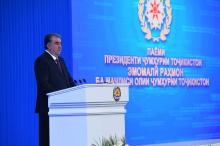
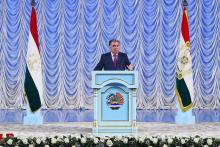
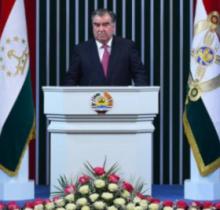
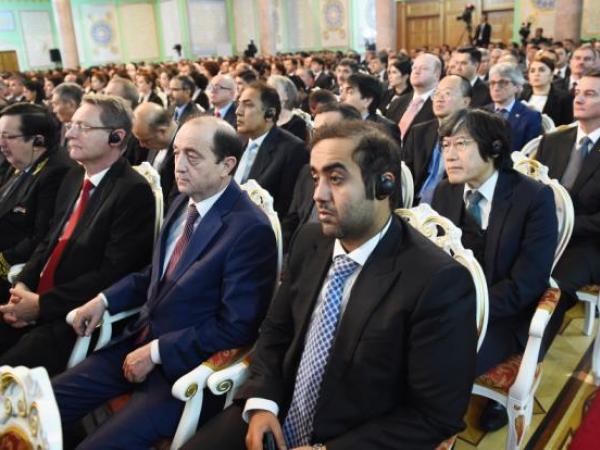

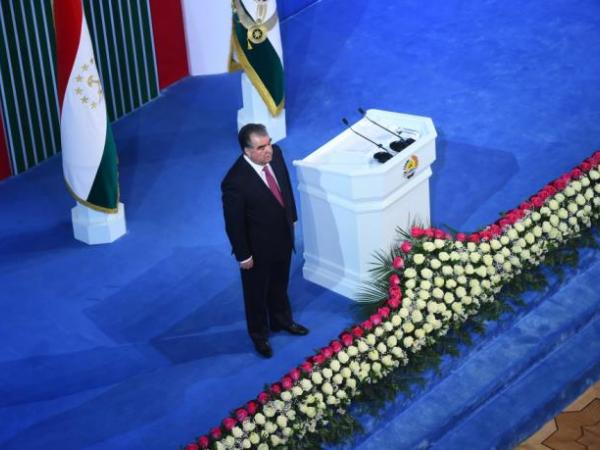

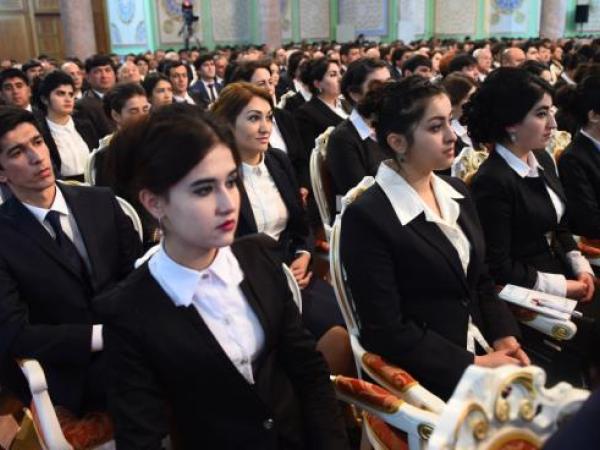
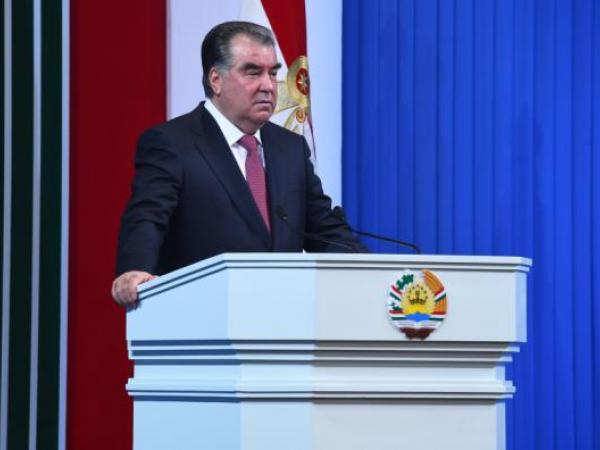
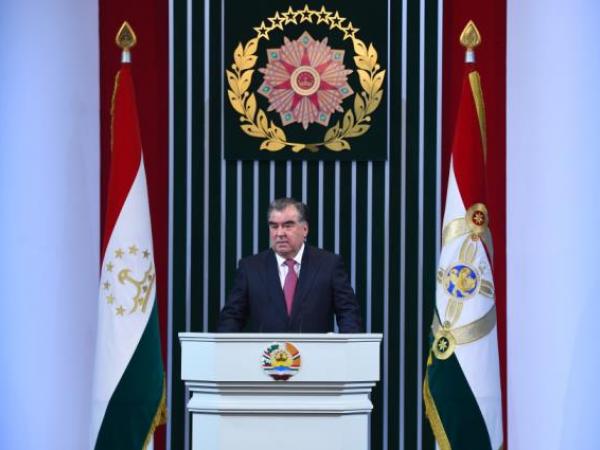



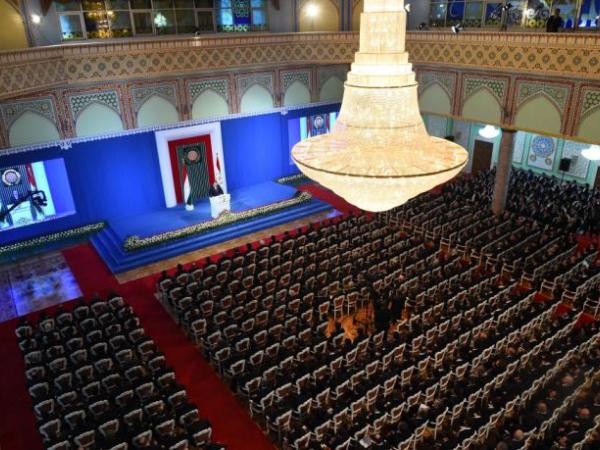
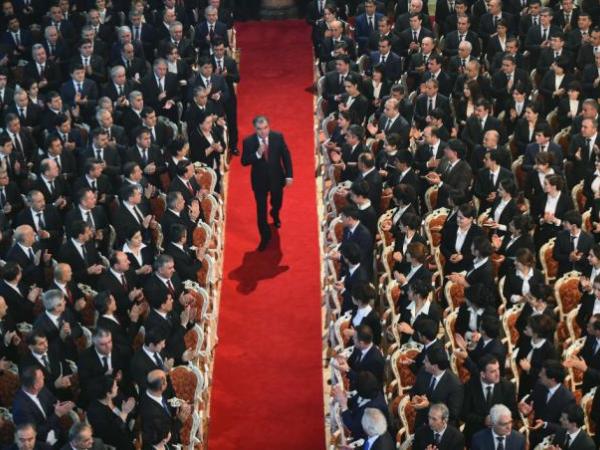
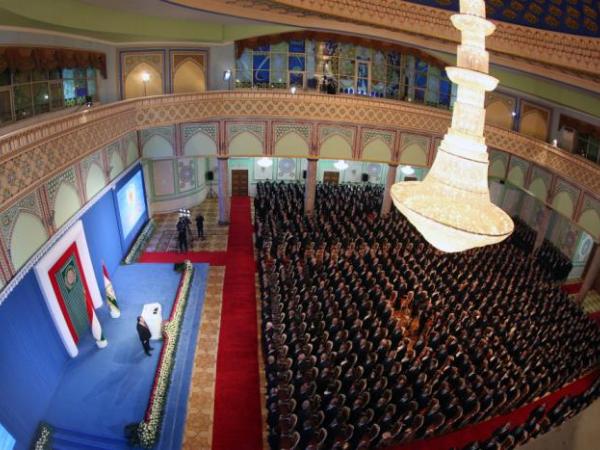
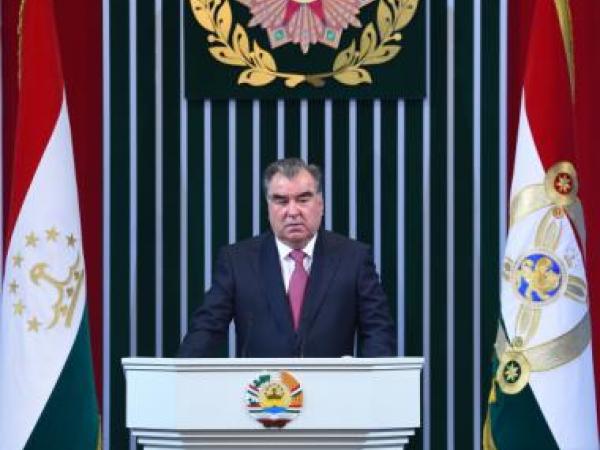
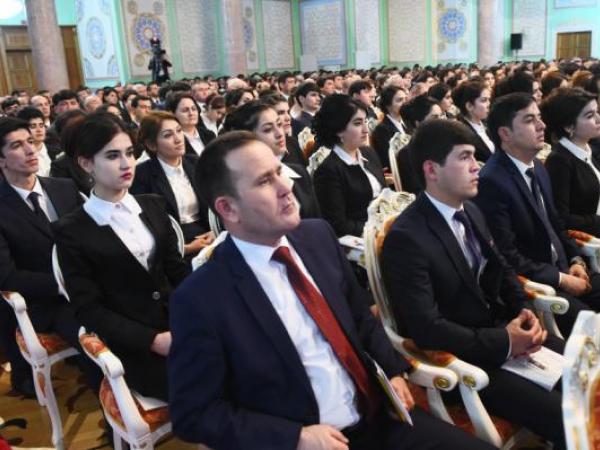
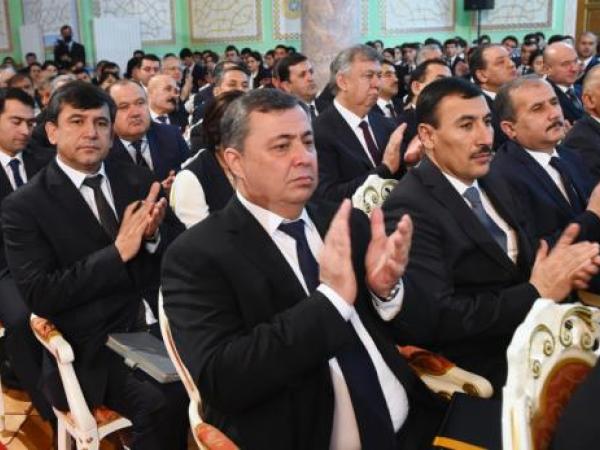
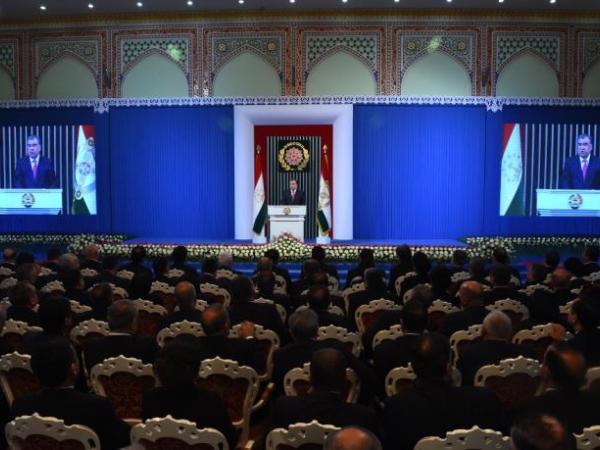
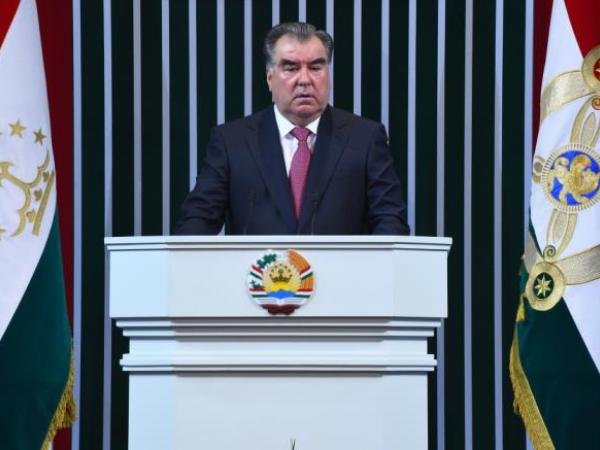
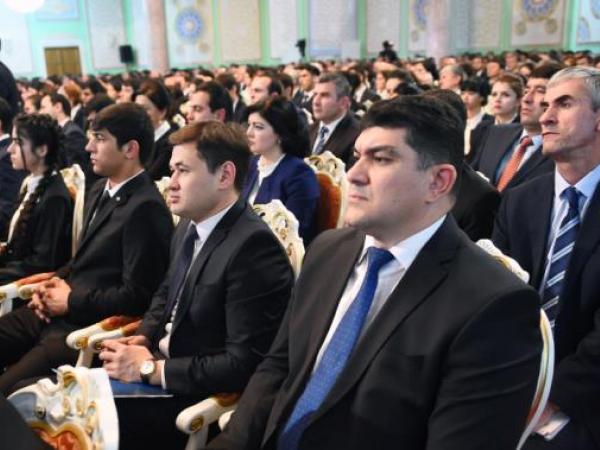
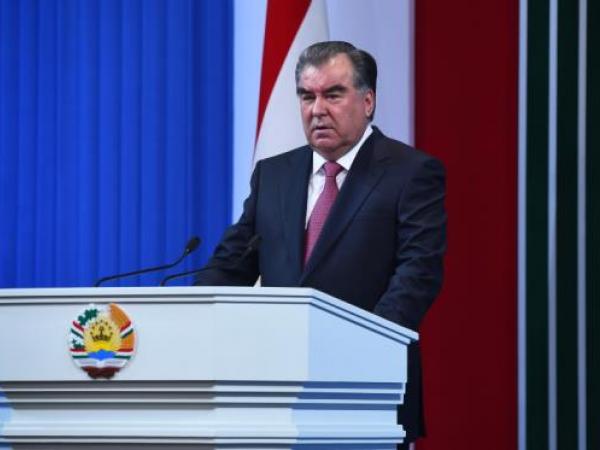






















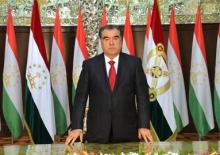
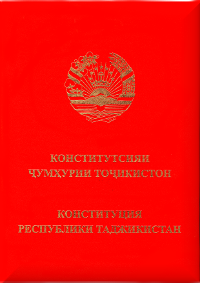


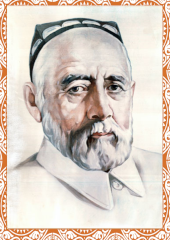 Адиб, олим ва асосгузори адабиёти муосири тоҷик. Аввалин Президенти Академияи илмҳои Ҷумҳурии Тоҷикистон. Муаллифи асарҳои «Таърихи амирони манғитияи Бухоро», «Таърихи инқилоби фикрӣ дар Бухоро», «Намунаи адабиёти тоҷик», «Дохунда», «Ғуломон», «Ёддоштҳо» ва дигар асарҳо, ки ба 29 забони хориҷӣ нашр шудаанд.
Адиб, олим ва асосгузори адабиёти муосири тоҷик. Аввалин Президенти Академияи илмҳои Ҷумҳурии Тоҷикистон. Муаллифи асарҳои «Таърихи амирони манғитияи Бухоро», «Таърихи инқилоби фикрӣ дар Бухоро», «Намунаи адабиёти тоҷик», «Дохунда», «Ғуломон», «Ёддоштҳо» ва дигар асарҳо, ки ба 29 забони хориҷӣ нашр шудаанд. Олим, академики Академияи Илмҳои ИҶШС, арбоби ҳизбӣ ва давлатӣ, муаллифи китоби оламшумули «Тоҷикон» ва зиёда аз 300 асару мақолаҳо.
Олим, академики Академияи Илмҳои ИҶШС, арбоби ҳизбӣ ва давлатӣ, муаллифи китоби оламшумули «Тоҷикон» ва зиёда аз 300 асару мақолаҳо.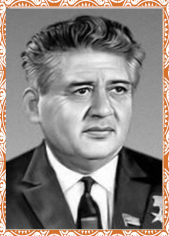 Шоири халқӣ, раиси Иттифоқи нависандагони Тоҷикистон, Қаҳрамони меҳнати сотсиалистӣ, Раиси Кумитаи якдилии халқҳои Осиё ва Африқо. Барои достонҳои «Қиссаи Ҳиндустон»(1948), «Ҳасани аробакаш», «Чароғи абадӣ», «Садои Осиё»,(1960) «Ҷони ширин» (1963) бо ҷоизаҳои давлатии ИҶШС, ҶШС Тоҷикистон ва байналмилалии ба номи Ҷ. Неҳру (1967) сарфароз шуда буд.
Шоири халқӣ, раиси Иттифоқи нависандагони Тоҷикистон, Қаҳрамони меҳнати сотсиалистӣ, Раиси Кумитаи якдилии халқҳои Осиё ва Африқо. Барои достонҳои «Қиссаи Ҳиндустон»(1948), «Ҳасани аробакаш», «Чароғи абадӣ», «Садои Осиё»,(1960) «Ҷони ширин» (1963) бо ҷоизаҳои давлатии ИҶШС, ҶШС Тоҷикистон ва байналмилалии ба номи Ҷ. Неҳру (1967) сарфароз шуда буд.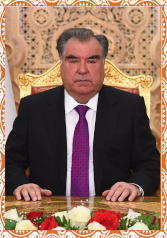 Президенти Ҷумҳурии Тоҷикистон. 19 ноябри соли 1992 дар иҷлосияи XVI Шўрои Олии Ҷумҳурии Тоҷикистон раиси Шўрои Олии Ҷумҳурии Тоҷикистон, 6 ноябри соли 1994 бори аввал, солҳои 1999, 2006 ва 2013 Президенти Ҷумҳурии Тоҷикистон интихоб гардидаст.
Президенти Ҷумҳурии Тоҷикистон. 19 ноябри соли 1992 дар иҷлосияи XVI Шўрои Олии Ҷумҳурии Тоҷикистон раиси Шўрои Олии Ҷумҳурии Тоҷикистон, 6 ноябри соли 1994 бори аввал, солҳои 1999, 2006 ва 2013 Президенти Ҷумҳурии Тоҷикистон интихоб гардидаст.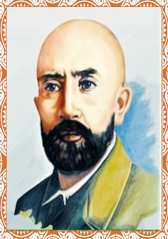 Нусратулло Махсум (Лутфуллоев) ходими давлатӣ ва ҳизбӣ. Солҳои 1924-1926 раиси Кумитаи инқилобии ҶМШС Тоҷикистон, солҳои 1926-1933 раиси Кумитаи Иҷроияи Марказии ҶШС Тоҷикистон.
Нусратулло Махсум (Лутфуллоев) ходими давлатӣ ва ҳизбӣ. Солҳои 1924-1926 раиси Кумитаи инқилобии ҶМШС Тоҷикистон, солҳои 1926-1933 раиси Кумитаи Иҷроияи Марказии ҶШС Тоҷикистон. Ходими давлатӣ ва ҳизбӣ. Солҳои 1929-1931 котиби Ҳизби коммунистии ҶШС Тоҷикистон, солҳои 1933-1937 Раиси Кумитаи Иҷроияи Марказии ҶШС Тоҷикистон.
Ходими давлатӣ ва ҳизбӣ. Солҳои 1929-1931 котиби Ҳизби коммунистии ҶШС Тоҷикистон, солҳои 1933-1937 Раиси Кумитаи Иҷроияи Марказии ҶШС Тоҷикистон.


